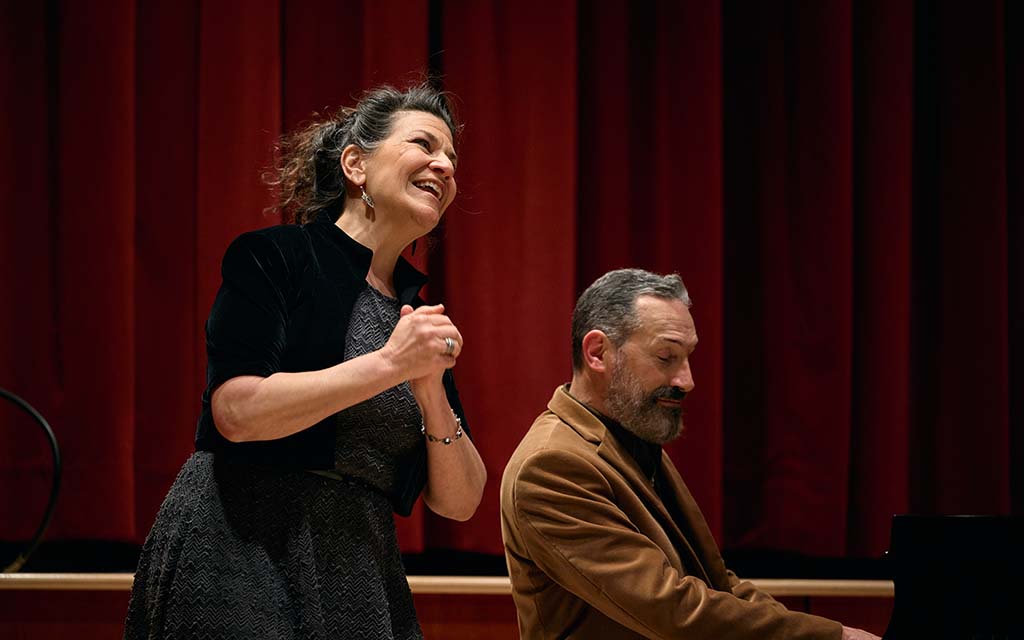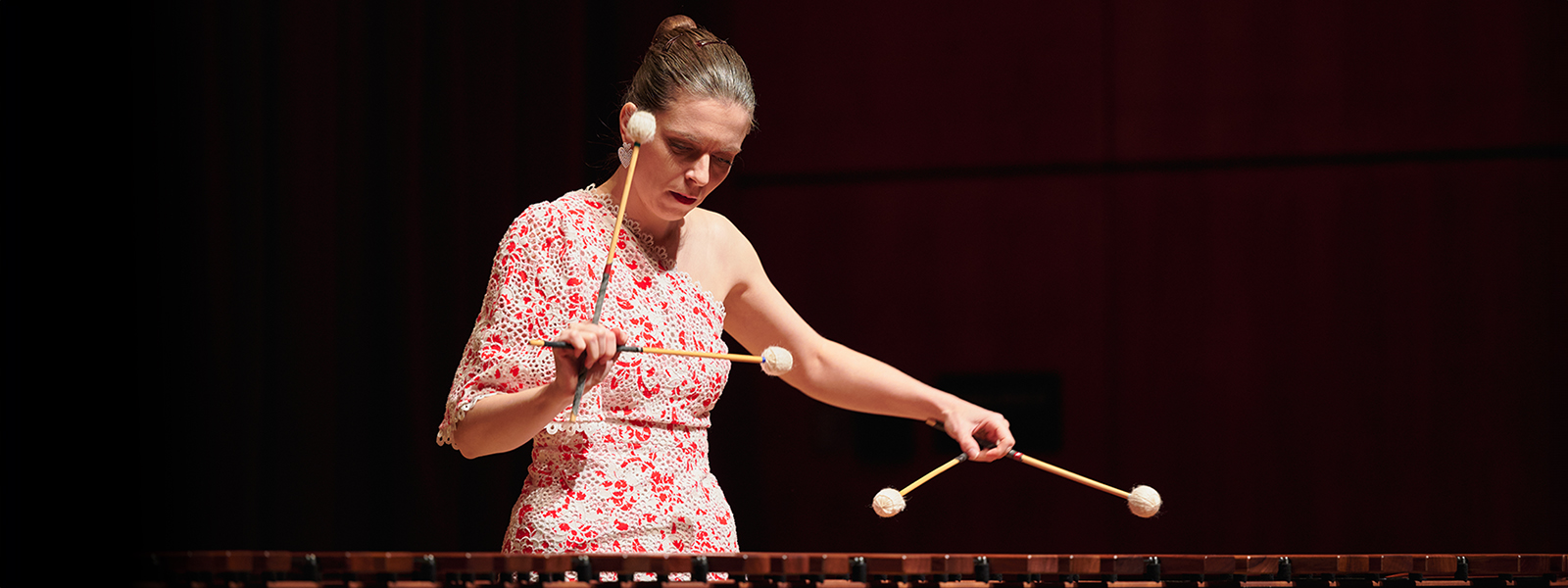The trailblazing journey of percussionist Ksenija Komljenović
If you do a web search for “famous percussionists,” you’ll likely see a Google-curated list of 51 musicians. 13 of these will be women — just a hair above 25%. Notably, all of the female percussionists on the list are still alive, a testament to just how recently women have been able to break into this traditionally male arena.
One trailblazer working to make space for women in percussion is musician, composer and educator Ksenija Komljenović, the percussion department chair in the School of Music. In 2017, she made history as the first woman from Serbia to earn her doctorate in percussion. Throughout her incredible career, she has constantly pushed to make percussion more accessible: She has combated stereotypes, forged international connections and mentored aspiring musicians worldwide, all while composing and performing music that seeks to inspire empathy and understanding.
Never too old
Komljenović was born and raised in Serbia. There, like in many European countries, students must start their musical studies early — before qualifying to even audition to study music at the conservatory level, they must first attend a specific music elementary school and high school. Komljenović was well on this track, double-majoring in piano and music theory in high school. Then, at 15, she saw her first percussion ensemble concert.
“These were concerts for children and other students, and people were just so excited to hear them play,” Komljenović remembers. She describes the percussionists playing an arrangement of Sting, a piece on tables with drumsticks, arranging some Chopin for marimbas and performing a drum set concerto. “It was all so cool,” she says.
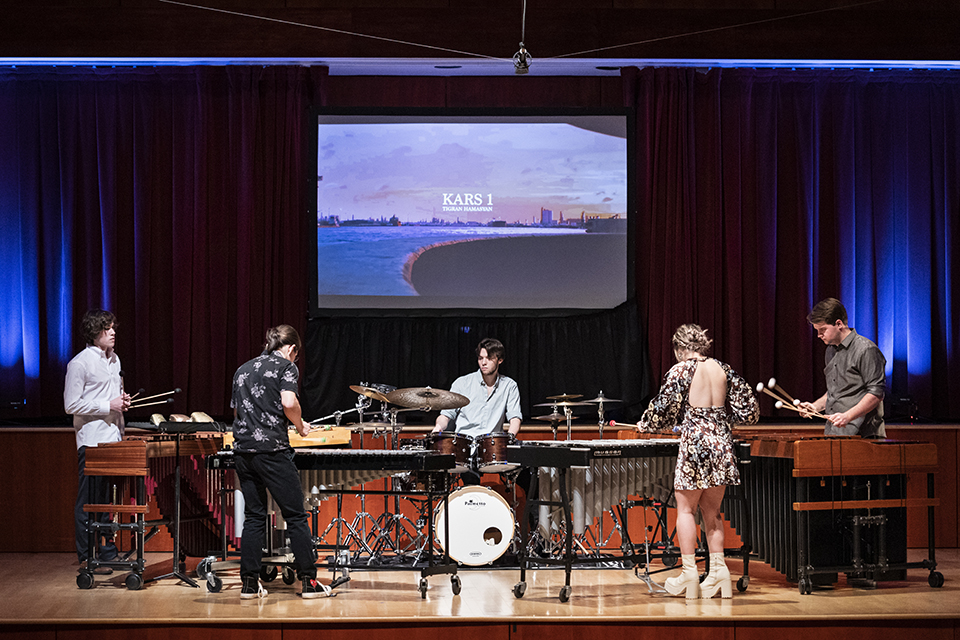
UNCSA Percusion Studio students Ben Burson, Miah Kay Cardoza, Ricky Hinojosa, Thompson Jones and Garrett Strauss performing "Kars 1" by Tigran Hamasyan, arranged for percussion by Ksenija Komljenović.
“So, at 15, I went to the person who was to become my percussion teacher and I asked him to let me into the studio. He said no — you’re too old.” The percussion teacher did the math for her: if she started studying the following year, at 16, she wouldn’t earn her bachelor's degree until she was 28. “Are you really going to start looking for a job for the first time close to your 30s?” he asked her. Komljenović was not deterred. With the help of some “arm twisting” from mutual friends, she was eventually admitted to the percussion program.
After 12 years of compressed studies — constantly practicing, studying and taking finals every few months — she not only had her bachelor’s degree, but had earned her Doctor of Musical Arts in Percussion.
Setting the record straight
Throughout her studies and subsequent career as a percussionist, Komljenović was repeatedly confronted with two stereotypes: As a female, it was questioned if she was physically capable of being a percussionist. As a percussionist, the credibility of her craft was doubted.
“Some people perceive percussionists as second-grade citizens in the world of music,” she explains. “Percussionists are frequently goofballs in the orchestra — they sit all the way in the back and they can get away with some things in certain orchestras. In certain environments, they’re seen as local clowns or jesters.” She says that this dynamic can get translated into percussionists not having a serious relationship with music, which is simply not true.
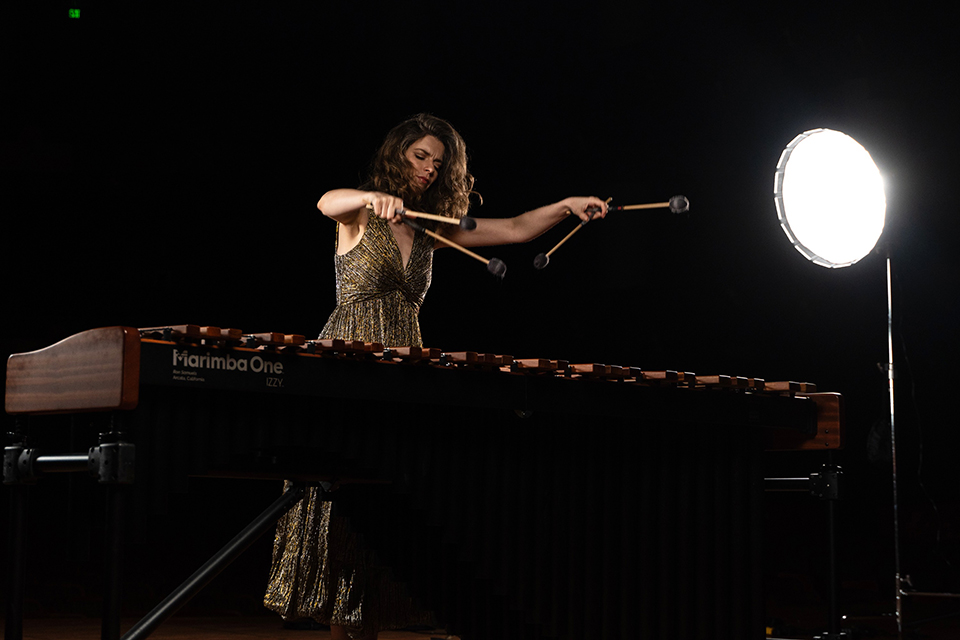
Photo courtesty of Ksenija Komljenović.
This is one misconception that is part of Komljenović’s mission to overcome. “I bring the music from my instruments to people so they see it’s just as beautiful as a violin or a piano or anything else,” she says. As a performer and an educator, she has presented hundreds of concerts and conducted over 50 masterclasses across the world.
And then there’s being a female percussionist.
The right environment
“When I first expressed my desire to play percussion, I had a lot of people in my environment say things like ‘why would you do that,’ ‘who would marry you,’ ‘who would want a girl that is that masculine’ and so on,” she remembers. Thankfully, Komljenović says we’re mostly beyond those types of comments, but women are still underrepresented in percussion.
In her dissertation for the Frost School of Music at the University of Miami, she explored the representation of professional female percussionists. While her research provided numerous insights into the field, her interview with Evelyn Glennie — both the world’s leading solo percussionist and the first person to ever establish a career as a percussion soloist — surprised her the most.
“When Evelyn described her background in Scotland growing up, she said that in her studio was a majority of girls,” Komljenović explains. “So it didn’t click for her until she got to college that it was a big deal that she was a woman playing.” Komljenović still gets chills just thinking about it.
“It really matters the environment that we put children in so that they can see themselves as being able to pursue this thing and make a living,” she says. Komljenović applies this concept in her classes at the School of Music, creating an empowering space for arts education.
“We aspire to raise great artists,” she says, “but I think we also primarily aspire to help people express themselves and bring beauty to the world, and to create a more loving and accepting environment.”
Building bridges
Komljenović’s work to make percussion more accessible includes much more than just fighting for gender parity in the field — since her early 20s, she’s also been building bridges between cultures. War in Serbia marked her early years, which significantly limited her mobility and the willingness of other artists to visit. “I moved countries without ever changing beds for the first couple of decades of my life,” she recalls.
As she was nearing her 20s, the country began opening up. As soon as there was an opportunity, Komljenović applied for an exchange program sponsoring students from Serbia to study for a year in the United States; she won the scholarship and was placed at Illinois State University. “I loved it so much because it opened my eyes to so many things — just talking to people who did not have the same upbringing as me,” she says.
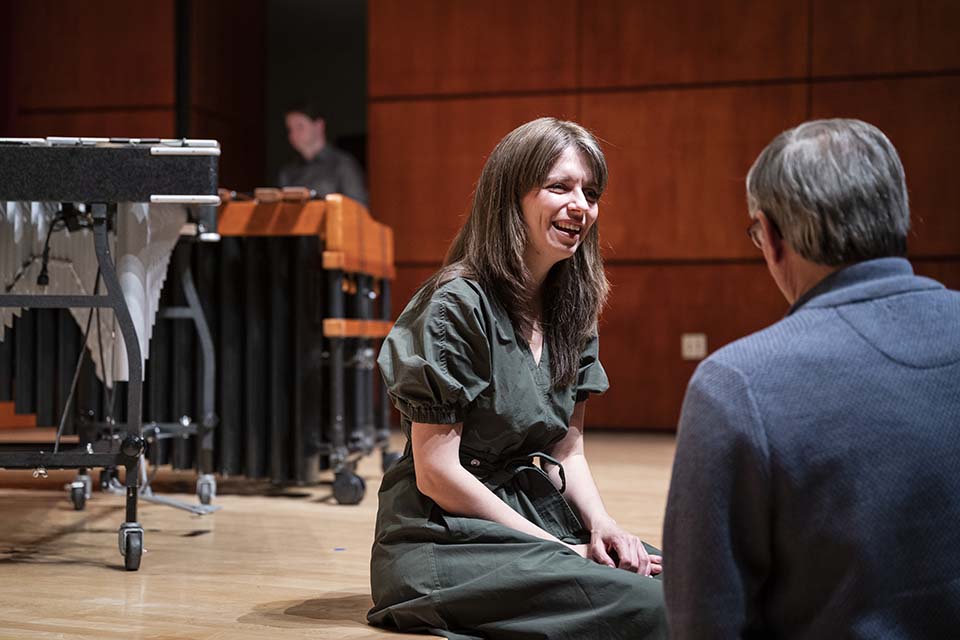
Ksenija Komljenović after the UNCSA Percussion Studio's 2023 recital.
The experience inspired Komljenović to organize a U.S.-Serbia drumline exchange. In her home country, she’d been part of the first Eastern European drumline, which had relied on YouTube videos from the U.S. to learn. Then she came to the States and saw it live. “I got to see it happen for real,” she says. “I loved it so much and thought ‘I cannot keep this experience to myself, what if I could give my ensemble back home a gift and organize something to bring real instructors back home?’”
Komljenović was just 22 years old when she contacted the U.S. Embassy. “I didn’t even know what I was doing,” she remembers. “But I got a $10,000 grant to bring five people to Serbia for a couple of weeks to work with my old drumline.” From there, the program expanded — the next year they raised even more money to bring additional instructors. “That was just a way of creating bridges.”
Creating inclusive spaces
After her first experience living abroad, she was hooked. Komljenović decided to continue changing where she lived, moving to places like Hong Kong. “I only grow through these moments where I really have to figure everything out from scratch — to think in a different language, to talk about music in a different language, to have a partner who comes from a different culture,” she explains.
My overall mission in everything I do is more love in the world and more understanding.
Ksenija Komljenović
Through her art and work as an educator, Komljenović strives to create inclusive spaces of truly diverse thinking. “My overall mission in everything I do is more love in the world and more understanding,” she says. At UNCSA, she brings this determination, alongside her mastery of the craft, significant entrepreneurial skills and her history-making experiences.
“There are so many horrible things going on in the world — there are wars and conflicts, and things we can and cannot control,” she says. “We will never run out of our need for love and that’s the only thing I want to put out.”
Get the best news, performance and alumni stories from UNCSA.
SUBSCRIBE TO OUR NEWSLETTERS(OPENS IN NEW TAB)(OPENS IN NEW TAB)(OPENS IN NEW TAB)(OPENS IN NEW TAB)(OPENS IN NEW TAB)(OPENS IN NEW TAB)(OPENS IN NEW TAB)(OPENS IN NEW TAB)(OPENS IN NEW TAB)(OPENS IN NEW TAB)
March 27, 2024
